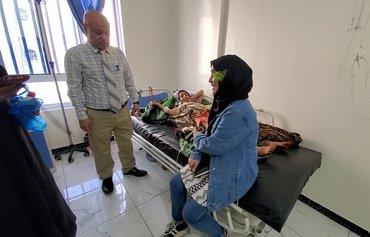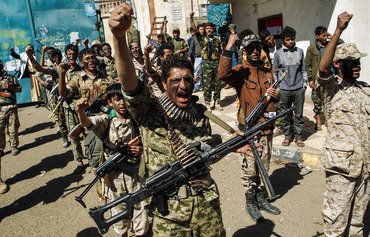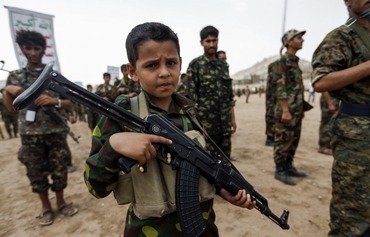ADEN -- A land mine planted by the Iran-backed Houthis in the Hays district of Yemen's al-Hodeidah province in September took the life of a teenage girl and wounded her two siblings -- one of many similarly devastating incidents.
Lina Khediri, 13, was killed in the September 2 explosion in the village of Beit Maghari, and her brother Nasser, 10, and sister Sinaa, 9, were injured, the Yemeni Landmine Records observatory said.
The family's tragedy is just one example of the violations of children's rights perpetrated by the Houthis since their coup in Sanaa in September 2014.
According to the Yemeni Network for Rights and Freedoms, the Houthis have committed about 21,000 violations of children's rights in the last four years alone.
![Youssef al-Badji, a Yemeni boy from Asaifra in Taez, was shot in the leg by a Houthi sniper. [National Committee to Investigate Alleged Violations of Human Rights]](/cnmi_am/images/2022/11/22/38653-yemen-wounded-child-600_384.jpg)
Youssef al-Badji, a Yemeni boy from Asaifra in Taez, was shot in the leg by a Houthi sniper. [National Committee to Investigate Alleged Violations of Human Rights]
In a new report, the network said it has documented 20,977 such violations carried out by the Houthis between June 1, 2018 and July 1, 2022.
This is in addition to the displacement of 43,608 children.
It said the violations ranged from "killing, injuring, kidnapping, displacement, deprivation of education" to being targeted by snipers, recruited as child soldiers and denied access to treatment, food and water in areas under siege.
The network said it has documented 1,343 extrajudicial killings of children, including of 31 infants, 1,620 bodily injuries and 321 cases of permanent disability.
It said it has documented 522 cases of arrest and kidnapping of children, most of whom were kidnapped for the purpose of blackmailing their families.
As for the recruitment of child soldiers, the report said, the Houthis have recruited 12,341 children as young as 14, and continue to do so.
This practice has resulted in the death of 1,716 children and the injury of 3,114 on the Houthi battlefronts, it said.
Targeting civilian neighbourhoods
"The Houthis have violated children's rights in a horrific and hideous manner, through sniping, mines and firing of mortar shells at civilian neighbourhoods," said Deputy Minister of Legal Affairs and Human Rights Nabil Abdul Hafeez.
This abuse has caused casualties among the young and old, he told Al-Mashareq, and has permanently disabled others.
The network's report is an "important effort", he said, noting that the reports of civil organisations are impartial and rely on integrity in investigating violations.
Abdul Hafeez pointed to the difficulty of monitoring all violations due to the obstacles placed by the Houthis. He said the ministry estimates the number of children recruited by the Houthis in eight years at almost 30,000.
Some were killed, he said, while others were permanently disabled or suffer from mental illnesses as a result of the horrors they experienced on the fronts.
Houthis' recruitment of children
"There is no doubt that children in Yemen are subjected to serious and ongoing violations," lawyer and human rights activist Abdul Rahman Berman told Al-Mashareq.
The Houthis are at the fore in terms of violations committed against children, he said, noting that the group is unmatched in recruiting children on a large scale.
"As a result of this recruitment, many of them were killed," he added, stressing the difficulty of monitoring all violations committed against children in Houthi-controlled areas due to the absence of activists and monitors.
"The monitoring and documentation process is important in order to take the next steps and prosecute the perpetrators," said National Committee to Investigate Alleged Violations of Human Rights spokeswoman Ishraq al-Maqtari.
Collecting and preserving evidence so it can be used legally are "very important", she said, noting that violations continue in most provinces, especially in the seven where military operations are taking place.
The objective of the monitoring and documentation operations is to ensure the victims "get their rights after these files are referred to the judiciary", she said.

![A Yemeni girl from Qubaita in Taez lost one leg after being targeted by a Houthi sniper. [National Committee to Investigate Alleged Violations of Human Rights]](/cnmi_am/images/2022/11/22/38652-yemen-wounded-children-600_384.jpg)






